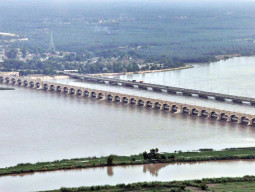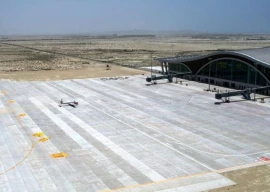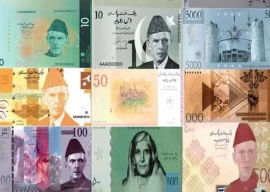1737688343-0/Shehbaz-(1)1737688343-0.jpg)
Prime Minister Shehbaz Sharif on Thursday termed the Country Partnership Framework (CPF) of the World Bank a landmark initiative forged through decade-long strategic cooperation to boost employment opportunities, IT-led initiatives and climate resilience ensuring economic stability.
He was addressing the launching ceremony of the landmark $20 billion Country Partnership Framework (CPF) which is a transformative initiative marking the longest-ever development partnership between Pakistan and the global financial institution. The strategic collaboration aims to address Pakistan's pressing economic and developmental challenges while fostering growth, climate resilience, and technological advancement.
The prime minister thanked the World Bank for placing faith in Pakistan after pledging to provide $20 billion under the 10-year country partnership framework (CPF) last week.
The prime minister underscored that the World Bank had supported Pakistan through various pivotal projects, ranging from hydropower and water management to transformative economic reforms.
He expressed gratitude to the World Bank team for their leadership in shaping the framework, describing it as a timely intervention to overcome Pakistan's immense challenges.
The prime minister highlighted the progress in digitizing the Federal Board of Revenue (FBR), introducing a pilot project at Karachi Port to reduce collusion between importers and customs officials. The initiative, which features faceless interactions, aims to increase inland revenue while curbing corruption, he added.
"These funds will be channeled into social protection projects for Pakistan's most vulnerable populations," he explained.
The prime minister assured the government's all-out commitment to implementing the CPF, urging unity among politicians, experts and bureaucrats to achieve the framework's ambitious targets.
"The (World Bank's) vice president's presence here demonstrates the World Bank's confidence in Pakistan's evolving system, which is taking bold, overdue steps toward vibrancy and functionality," he remarked.
The prime minister extended his vote of thanks to the World Bank Vice President in German language and underscored Pakistan's readiness for a new era of development, with an emphasis on public-private partnerships and sustainable growth under the CPF.
World Bank Vice President for South Asia Region Martin Raiser praised Pakistan's recent economic reforms and reiterated the institution's commitment to the partnership.
"The CPF will anchor the economic stability needed for Pakistan and the region," he said, commending the prime minister's leadership and urging continued collaboration to ensure the program's success.
Najy Benhassine, the Country Director of the World Bank for Pakistan, said that the $20 billion "is an indicative figure projecting our current engagements and the decision about project, programme loan and provincial shares would be made after discussions with the authorities". The targets are estimates based on what we have been able to achieve or can achieve, he added.
Pakistan's average child stunting rate is 38%, one of the highest globally, and exceeds 60% in the poorest rural districts. Educational attainment is also low, with 25.4 million children aged 5-16 (one-third of the age group) out of school, most of them girls.
Over the next decade, the World Bank aims to provide quality health, nutrition, and population services to 50 million people. It also plans to ensure 30 million women use modern contraceptives and provide water, sanitation, and hygiene services to 60 million people.
Approximately 12 million children - almost half of those currently out of school - will receive quality education. By 2035, 30 million people will achieve nutrition security, and 75 million will gain enhanced climate resilience.
Martin said that the World Bank Group's resources are not enough to achieve the ambitions of the Country Partnership Framework, therefore, there is a need to reach out to the private sector and catalyze private sector investment. He said that the World Bank would also collaborate with the international development partners to align the goals and pool the resources.
The new CPF is strategically designed to complement the government's programme and to address the country's more important challenges, said the Vice President.
Focus, leverage and long-term approach and tangible targets are the essence of the new framework and it marks a departure in the way we engage with Pakistan, said Martin. Pakistan is the pioneer of the revolution and the World Bank board was also enthusiastic about the new approach, he added.
Martin Raiser, the Vice President of the World Bank for South Asia, said that the World Bank will adjust the course as the country partnership framework progresses. Some of the areas may progress faster than others and the plans will be changed in light of the new changes while keeping in mind the long-term sustainable goals, he added.
To a question, Najy said that digital transformation is 100% enabler for the government to achieve Pakistan's development goal. "This morning we had long discussions with the Chairman NADRA looking at ongoing reforms and actions and the potential for digital Pakistan is enormous", said Najy.
Digital transformation is a 100% enabler for the implementation of the CPF and there is no question about it, he added.
Najy said that there were also two connecting themes, transport infrastructure and digital solutions. He said that for reducing learning poverty there will be a need to construct a lot of rural roads.
Najy said that the World Bank's new macroeconomic projections will be updated in April this year. The World Bank's new framework also aims to increase Pakistan's tax-to-GDP ratio to 15% within a decade and boost public spending on the bottom half of the population by 60%.
Zeeshan Sheikh, Country Manager for Pakistan and Afghanistan, said that as of today private sector investment is very small proportionate in terms of overall size of Pakistan's economy and the issues hampering the investment will be addressed under the new strategy.
A decade-long partnership aims to address the most difficult economic challenges that Pakistan's economy is facing today, said Dr Kazim Niaz, the Secretary for Economic Affairs.

1737708567-0/BeFunky-collage-(32)1737708567-0-405x300.webp)


1737707799-0/BeFunky-collage-(31)1737707799-0-165x106.webp)
1737706577-0/BeFunky-collage-(30)1737706577-0-165x106.webp)



1737688343-0/Shehbaz-(1)1737688343-0-270x192.webp)
1737709645-0/Express-Tribune---News-Desk-(3)1737709645-0-270x192.webp)




1737614355-0/Express-Tribune-(1)1737614355-0-270x192.webp)








COMMENTS
Comments are moderated and generally will be posted if they are on-topic and not abusive.
For more information, please see our Comments FAQ